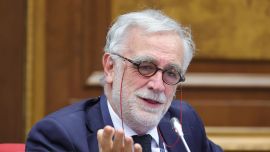NOTA:
Anyone who listens to reports from Kabul – where distraught people tell BBC journalists how desperately hard it is for them to get their hands on money to pay for groceries because the cash machines are reluctant to disgorge banknotes, the local currency is losing value and financial help from outside is in short supply – will be struck by the similarities between the economic travails urban Afghans are now experiencing and what has long been routine in Taliban-free Argentina.
In both countries, many who until not that long ago had expected things to get steadily better feel trapped and want to get out. The difference is that those Afghans who rather fancied the Western way if life and would dearly like to enjoy some of its amenities are up against a horde of ruthless religious fanatics who, thanks to Joe Biden, have just been handed billions of dollars worth of high-tech weaponry, while here the big enemy, which has been ravaging the country for well over half a century, is militant stupidity.
Is this about to change? There is no reason to think so. In Argentina, as in many other countries, politics has always had more to do with tribal feelings than with anything else, which is one reason why those interested in the matter are fond of comparing political loyalties to those of football fans who will continue to support their team no matter how wretchedly it may have performed in recent years. What elsewhere is called “identity politics” – the notion that people are defined by whatever group they think they belong to – has been with us for a very long time. Large chunks of the electorate can be relied on to vote for the Peronists for vague but powerful reasons despite the evident fact that they have played a leading role in turning Argentina into a poverty-stricken backwater which is well on the way to becoming a failed state. For them, reminding others they are die-hard Peronists is a way of expressing their identity. Luckily, some, perhaps many, are beginning to have second thoughts. This clearly worries Alberto Fernández, Cristina Fernández de Kirchner and their sidekicks.
With the “primaries” fast approaching, not only the Peronists but most other politicians are in an escapist mood and are careful not to tell voters what, if anything, they think should put the country on the road to recovery. Government supporters want to distract attention from the strange antics of Alberto or the excessive influence of his boss, Cristina, who very much wants to make the Judiciary dance to her tune. For their part, opposition candidates have no desire to say with any precision what they think would have to be done to prevent the country from going down the plughole, presumably because they fear that even the most “gradualist” of suggestions would scare off people who might otherwise vote for them. Both sides make out that, though on occasion they may have got things a bit wrong, their opponents are far worse.
In this unedifying contest, the Peronists, especially the hard-line Kirchnerites, are at a disadvantage. As well as still having to explain away the Afghan-scale corruption that helped make the Kirchner family’s 12 years in the Pink House so memorable, what with bags full of loot getting tossed into dodgy convents and bank clerks from Santa Cruz becoming multimillionaires overnight, they have to defend the government’s handling of the coronavirus pandemic, a vaccination programme in which youthful Kirchnerite stalwarts and party hacks got their jabs long before medical personnel or old folk categorised as vulnerable, and more recently, Alberto’s willingness to overlook the stern lockdown rules he himself had promulgated with considerable emphasis in order to let his girlfriend stage a birthday party in the Olivos presidential residence and much else besides.
Not surprisingly, Peronist candidates have preferred to talk about something completely different. The most creative so far has been the attractive blonde grandma who leads the movement’s Buenos Aires Province ticket, Victoria Tolosa Paz, who to widespread amusement, and the disapproval of those who in their old-fashioned way take still decorum seriously, came out with a raunchy defence of promiscuity; in her view, whether based on personal experience or mere hearsay, Peronists are far sexier than their uptight adversaries. Her allusions to the apparently incessant activities in that particular area of members of her own tribe were attributed by onlookers to her desire to make a name for herself and, while about it, recapture the youth vote which, if the pollsters are right, has been drifting away from people like her who are seen as stuck in a rapidly receding past.
Almost as creative as Victoria but far less whimsical was the government’s security minister, anthropologist Sabina Frederic, who said that countries such as Switzerland, in which violent street crime is less of a problem than it is here, were boring places to live in. Here, travelling to work can be as exciting an adventure as trekking through Taliban-infested regions.
Another episode which could affect what happens in the voting booths involved a schoolteacher who got filmed subjecting a student to a violent political rant for daring to ask her what good the Peronists had ever done to the country; the ignorant youngster was unaware that all Argentina’s many ills are the work of the archfiend Mauricio Macri. With his habitual sureness of touch, Alberto congratulated the poor woman, whose pedagogic style had alarmed many of her fellow Peronists and was being gleefully exploited by the opposition, for initiating a debate that should open her students’ minds.
While all this has provided those who take an interest in what politicians are up to with some light relief, it has nothing to do with the huge problems confronting the country. Like Nero who, if Tacitus, who despised him, is to be believed, was said to have “fiddled while Rome burned,” most of the people in charge seem determined to believe that nothing really bad is happening, so they might as well just sit it out. If this really is the case, they had better get their papers in order and pray that Ezeiza airport stays open long enough for them to make a getaway, but perhaps some do understand that, after the government has finished splurging all the remaining money on electioneering, the economy could suffer yet another almighty crash. As the North Americans and their Afghan allies have just reminded us, in today’s world bad things can happen far faster than even the most pessimistic experts believe is possible.























Comments